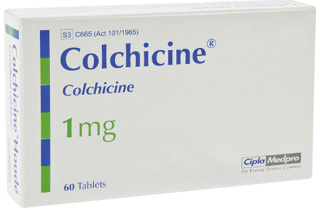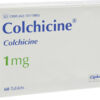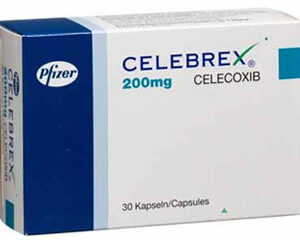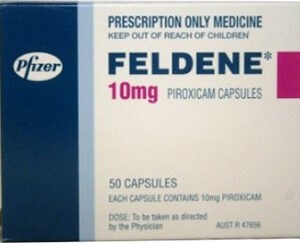Colchicine is a medication that is primarily used to treat gout and other conditions involving joint pain. It belongs to a class of drugs known as anti-inflammatory agents and works by reducing swelling and pain in the affected area. Colchicine is derived from the autumn crocus plant and has been used for centuries to alleviate symptoms associated with gout. Today, it is available in both generic and brand-name formulations, commonly prescribed by healthcare professionals to manage acute gout attacks or prevent them altogether.
When taken as directed, colchicine effectively inhibits the excessive buildup of uric acid crystals in the joints, providing relief from the excruciating pain that accompanies conditions such as gout. Additionally, this medication may also be utilized in the treatment of various other inflammatory conditions, including familial Mediterranean fever, Behçet’s disease, and pericarditis. Colchicine is available in oral tablet form, and the dosage regimen will depend on the specific condition being treated, as well as the patient’s age, overall health, and other factors determined by the prescribing healthcare professional.
Avoiding Risks with Colchicine
Before considering the use of colchicine, it is essential to understand the contraindications associated with this medication. Individuals who have a known allergy to colchicine or any of its components should avoid taking this drug, as it may result in severe allergic reactions. Additionally, individuals with specific medical conditions such as liver or kidney disease, blood disorders, and gastrointestinal disorders should exercise caution while using colchicine or may require dosage adjustments based on their healthcare provider’s recommendations.
Colchicine Reactions
Like any medication, colchicine may cause certain side effects in some individuals. Common side effects associated with this drug include gastrointestinal disturbances such as diarrhea, nausea, and vomiting. These symptoms are usually mild and subside over time. However, if these side effects persist or worsen, it is crucial to consult a healthcare professional for further evaluation.
In rare cases, colchicine may cause more serious side effects, including muscle weakness, numbness or tingling sensation in the hands or feet, unexplained bruising or bleeding, and signs of infection. If any of these severe reactions occur, immediate medical attention should be sought.
Administration
Colchicine should be taken exactly as prescribed by a healthcare professional. It is typically administered orally, with or without food. To alleviate the symptoms of an acute gout attack, an initial dose of colchicine may be prescribed, followed by smaller doses to prevent future flare-ups or to control chronic conditions such as familial Mediterranean fever. It is essential to follow the prescribed dosage and schedule to ensure maximum effectiveness.
If a dose of colchicine is missed, it should be taken as soon as remembered. However, if it is close to the time for the next scheduled dose, it is recommended to skip the missed dose and continue with the regular dosing schedule. Taking a double dose to make up for a missed one should be avoided. In the case of an overdose, immediate medical attention should be sought, as it may lead to severe gastrointestinal symptoms and other complications.
Understanding Drug Interactions
Colchicine may interact with certain medications, resulting in potential drug interactions that can affect its efficacy or increase the risk of adverse effects. It is essential to inform the healthcare professional about all medications, including prescription, over-the-counter, and herbal supplements, being taken concurrently with colchicine.
Some medications that may interact with colchicine include CYP3A4 inhibitors, which include drugs such as clarithromycin and erythromycin, as well as P-glycoprotein inhibitors like cyclosporine. These medications can increase the concentration of colchicine in the blood, leading to a higher risk of side effects. On the other hand, CYP3A4 inducers like rifampin and St. John’s wort may decrease the effectiveness of colchicine.
Moreover, patients should also be cautious with grapefruit and grapefruit juice consumption while taking colchicine, as it may increase the drug’s concentration in the body, potentially leading to adverse effects.
Inquiring About Colchicine
-
What conditions does colchicine primarily treat?
Colchicine is primarily used to treat gout and other conditions involving joint pain.
-
What are the common side effects of colchicine?
The common side effects of colchicine include gastrointestinal disturbances such as diarrhea, nausea, and vomiting.
-
How should colchicine be taken?
Colchicine should be taken exactly as prescribed by a healthcare professional, typically orally with or without food.
-
What happens if a dose of colchicine is missed?
If a dose of colchicine is missed, it should be taken as soon as remembered. However, if it is close to the time for the next scheduled dose, it is recommended to skip the missed dose and continue with the regular dosing schedule.
-
What medications can interact with colchicine?
Colchicine may interact with medications such as CYP3A4 inhibitors, P-glycoprotein inhibitors, and CYP3A4 inducers, as well as grapefruit and grapefruit juice.





Reviews
There are no reviews yet.